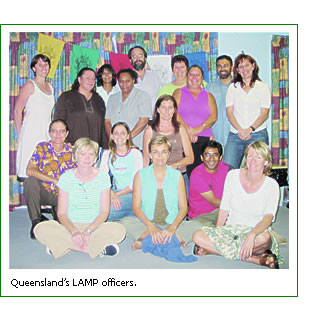The Local Government Association of Queensland (LGAQ) is promoting access, participation and cohesion in Queensland’s culturally diverse society through a partnership program involving State and Local Government. Established in 1998, the Queensland State Government, through Multicultural Affairs Queensland, has committed to fund the Local Area Multicultural Partnership (LAMP) program until at least March 2008. Sixteen Councils are currently involved in the program, including Brisbane, Logan, Gold Coast, Ipswich, Toowoomba, Caboolture, Maroochy, Hervey Bay and Maryborough (shared program), Gladstone, Rockhampton, Livingstone, Mackay, Townsville, Johnstone and Cairns. Each Council employs a staff member who aims to increase understanding and appreciation of cultural diversity in Local Government and community life; and improve access by members of diverse ethnic groups to the services provided by government. For example, as a result of several natural disasters, in particular Cyclone Larry, LAMP is currently prompting Councils to translate valuable documents, such as preparing for natural disasters, into a number of different languages so that everyone has access to them.
However, LGAQ’S LAMP Coordinator, Lindy Drew, said the LAMP program is not just about recent arrivals, it is about everyone.
“By making people aware of the advantages of cultural diversity, levels of conflict decrease, a greater number of people get involved in the community, and economic benefits are realised through cultural knowledge, languages and international business links,” she said.
A key feature of the LAMP program is that each Council is encouraged to design a program that suits the make up, needs and aspirations of their own community.
“The model works for a Council as large as Brisbane and for one as small as Johnstone Shire in the far north,” Lindy Drew said. “Generally, a Council’s first task is to get to know the make up of their culturally diverse communities. It is not uncommon for the reality to be quite a surprise. Caboolture, for example, discovered that Samoan was the second most spoken language in the Shire after English, which had previously not been acknowledged because Samoan migrants were generally coming into Australia via New Zealand. Since then, a broad range of coordinated responses to meet the needs of that community have been introduced, generally in partnership with State and Federal Government departments.
“Once relationships of trust have been built between Council and each group, opportunities for joint projects emerge. Most Councils then formulate these projects into four year community relations plans or formal cultural diversity policies.”
The LAMP program is strategically designed for all involved Councils to work together. LGAQ provides leadership to coordinate the program and promotes best practice. Council’s LAMP Officers attend two training sessions per year where they can network, share best practice examples and information that can assist each Council to further develop their own programs.
The LGAQ selects one member Council each month to showcase projects and initiatives they are working on via the LGAQ website. With approximately 1,400 migrants from the African continent alone, Toowoomba City Council was showcased in March 2006.
Council’s LAMP Officer, Elizabeth Jones, said Toowoomba has a unique coordinated approach with service providers to address cultural diversity issues.
“We have two groups, a Cultural Diversity Network (CDN) and a Refugee and Migrant Settlement Services Interagency (RAMSSI),” she said. “The two groups were established to ensure we work together as service providers and as a community.”
The CDN comprises community members, support providers and anyone interested in multicultural issues. The group meets once every quarter to participate in training and development and information sessions.
“Previous gatherings have included guest speakers from support providers, such as the African Unit at Centrelink,” Elizabeth Jones said. “They discuss what they do, how they do it and how best to deal with situations concerning a specific migrant group.”
The CDN also participates in round robin information sharing, where members pass on information about upcoming conferences and events.
In contrast, RAMSSI meets once a month and involves all service providers, including Council, Anglicare (Spiritus), Centrelink, employment agencies and community project workers. RAMSSI is the head body of eight subcommittees, which cover health, transport, education, policing and community, employment and training, housing, young people and media and community awareness.
RAMSSI discusses emerging issues and collectively looks for available grants and funding. A collegial, collaborative approach is taken in developing submissions. This approach eliminates competition caused by each agency working against each other.
“The group has also formed a mailing list to keep each other updated on issues and funding opportunities,” Elizabeth Jones said. “Information can therefore be passed on quickly and the group stays well informed.”
Elizabeth Jones said the LAMP Officers have also developed an emailing list. “If I have a problem I haven’t come across before, I send an email out to all other LAMP Officers,” she said. “I usually get a response with advice back promptly and like this we solve our problems together.”
Lindy Drew said the LAMP program was ahead of its time when it was introduced eight years ago, but with the growth of skilled migration, it’s importance is now becoming widely recognised.
“The LGAQ has applied for an additional State grant to research how skilled migrants settle in regional and remote communities,” she said. “The study will look at the impact of skilled migration on communities, Councils and the migrants themselves, and will record and disseminate good projects developing across Queensland. The report is due for release in September.”
For further information contact Lindy Drew on (07) 3000 2235 or lindy_drew@lgaq.asn.au

















